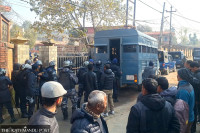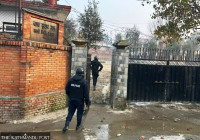Valley
Kathmandu’s latest dilemma: What to do with owners who don’t scoop their dogs’ poop?
More residents are keeping dogs as pets, but city officials say they have no idea how to enforce cleaning up the waste.
Anup Ojha
When Sangita Amatya steps out of her house every morning, what annoys her the most is a pile of dog poop on the roadside. The 42-year-old housewife says people from other neighbourhoods bring their pets for a walk—and then do not clean up after them.
“They are not just walking their dogs. They are bringing them out to let them defecate in the open,” said Amatya.
Canine faeces are a foul public problem worldwide, but in many cities, pet owners and city authorities have come up with regulations to deal with it. Some cities have anti-dog waste campaigns, while others simply put strict pooper-scooper laws in place to keep parks and public places clean.
[Read: This is where Kathmandu’s dead dogs go]
However, most Nepalis are yet to recognise this lack of dog etiquette as a problem.
“If they can spend so much money on owning pets, they should also learn to clean the poop,” Amatya said.
Officials at the Kathmandu Metropolitan City say the trend of keeping pet dogs has increased in Kathmandu in recent years—for security reasons, to take away the loneliness, as a status symbol, or due to intimacy to the most faithful companion of humans since ancient times.
According to data available at the city office, Kathmandu has around 80,000 pet dogs and 26,000 stray dogs.
Given such a big number of dogs in the city, people walking their pets during the morning and evening hours, and letting them pee and poop on the sidewalks is a ubiquitous sight. For stray dogs, the road is their toilet.
What most residents are not aware of, veterinarians say, is dog faeces can cause different kinds of diseases, both in humans and pets.
“Dog poop around city areas is a grave issue, but the metropolitan city has never shown interest to address this,” said Dr Gauriman Shrestha, a veterinarian. “I have time and again raised this issue, but in vain.”
The Kathmandu Metropolitan City says its focus currently is on managing household waste in a proper manner and that it has yet to think about dealing with dog fouling.
Hari Bahadur Shrestha, chief of the Environment Division at the Kathmandu Metropolitan City, said the city office does not have specific laws to take action against those who don’t clean up after their pets on roads and open spaces.
“Even I am not sure which government agency should deal with this issue—the Ministry of Health or the Ministry of Agriculture and Livestock Development,” Shrestha told the Post. “We will soon hold a meeting and try to come up with a plan of action.”
Many residents say the problem is not the lack of law; it’s a lack of awareness.
Jyoti Gurung from Swayambhu said she also has a dog at her home but she does not take her pet out to poop.
“Law cannot stop this; it is just a deterrent,” Gurung, a doctor by profession, told the Post. “Those who own dogs must realise it is just not right to let their dogs poop on the roadsides. It’s about awareness.”
Kennel clubs in Kathmandu admit that raising awareness about scooping their pets’ poop among dog owners is a tough task. While owners can train their pets to some extent, for specific training, specialist trainers are required.
“It’s not that difficult to potty-train a dog but it needs patience and perseverance; one needs to constantly work with their pets for days,” said Bishnu Paudel, sales in-charge of Mount Everest Kennel Club in Baneshwor Height. Poudel said the club gives at least half an hour of orientation to customers on ways to handle the pet, including how to train them to poop in a designated place.
“We do tell them about the harm of letting dogs deposit out in the open,” he said, “but that’s the maximum we can do."
***
What do you think?
Dear reader, we’d like to hear from you. We regularly publish letters to the editor on contemporary issues or direct responses to something the Post has recently published. Please send your letters to [email protected] with "Letter to the Editor" in the subject line. Please include your name, location, and a contact address so one of our editors can reach out to you.




 20.12°C Kathmandu
20.12°C Kathmandu.jpg)











